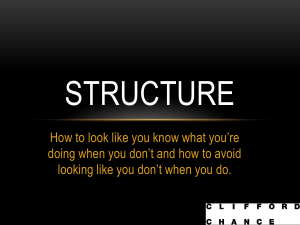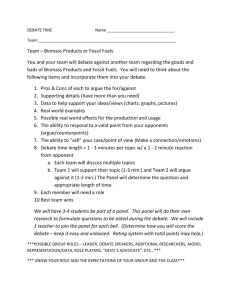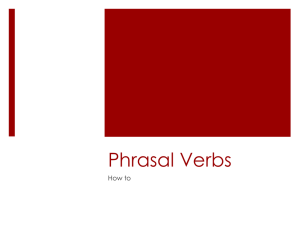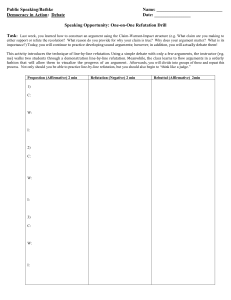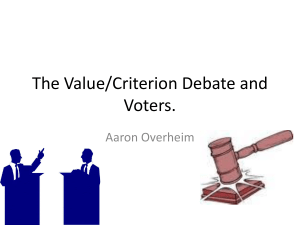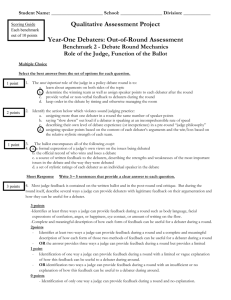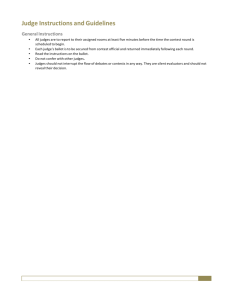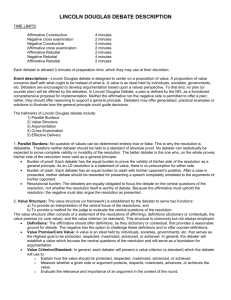WHAT KIND OF DEBATER ARE YOU quiz
advertisement
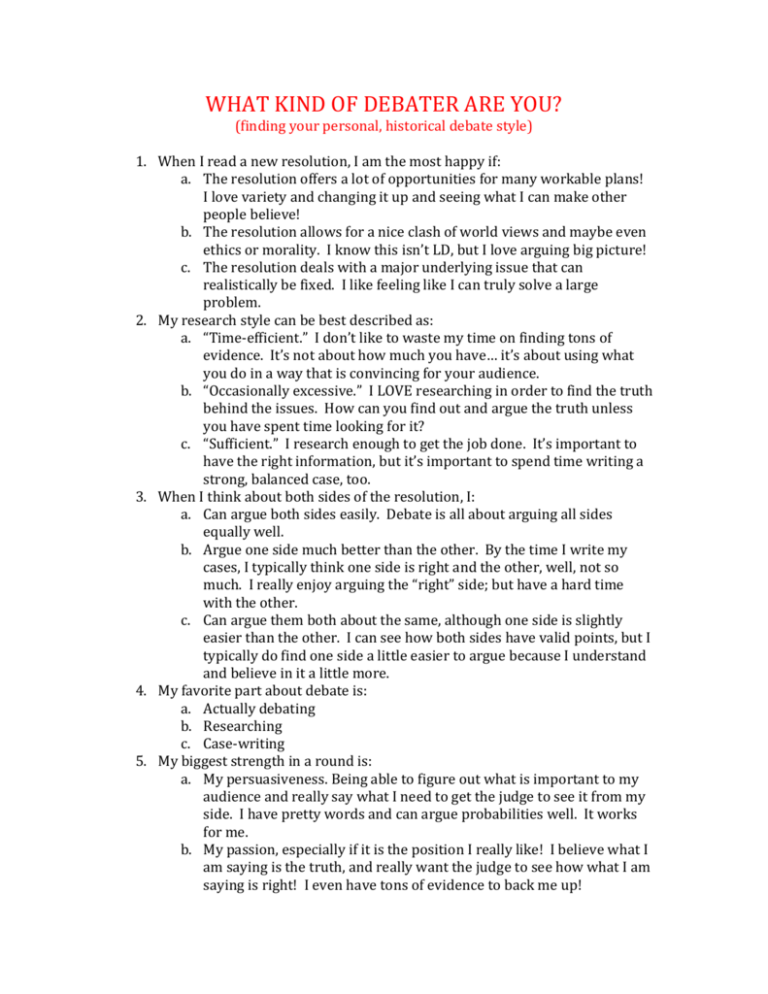
WHAT KIND OF DEBATER ARE YOU? (finding your personal, historical debate style) 1. When I read a new resolution, I am the most happy if: a. The resolution offers a lot of opportunities for many workable plans! I love variety and changing it up and seeing what I can make other people believe! b. The resolution allows for a nice clash of world views and maybe even ethics or morality. I know this isn’t LD, but I love arguing big picture! c. The resolution deals with a major underlying issue that can realistically be fixed. I like feeling like I can truly solve a large problem. 2. My research style can be best described as: a. “Time-efficient.” I don’t like to waste my time on finding tons of evidence. It’s not about how much you have… it’s about using what you do in a way that is convincing for your audience. b. “Occasionally excessive.” I LOVE researching in order to find the truth behind the issues. How can you find out and argue the truth unless you have spent time looking for it? c. “Sufficient.” I research enough to get the job done. It’s important to have the right information, but it’s important to spend time writing a strong, balanced case, too. 3. When I think about both sides of the resolution, I: a. Can argue both sides easily. Debate is all about arguing all sides equally well. b. Argue one side much better than the other. By the time I write my cases, I typically think one side is right and the other, well, not so much. I really enjoy arguing the “right” side; but have a hard time with the other. c. Can argue them both about the same, although one side is slightly easier than the other. I can see how both sides have valid points, but I typically do find one side a little easier to argue because I understand and believe in it a little more. 4. My favorite part about debate is: a. Actually debating b. Researching c. Case-writing 5. My biggest strength in a round is: a. My persuasiveness. Being able to figure out what is important to my audience and really say what I need to get the judge to see it from my side. I have pretty words and can argue probabilities well. It works for me. b. My passion, especially if it is the position I really like! I believe what I am saying is the truth, and really want the judge to see how what I am saying is right! I even have tons of evidence to back me up! c. My balanced approach. I want them to see the big picture, but also that my plan can work. Showing them the importance of the issue as well as proving the stocks are my biggest asset as a debater. 6. I believe that truth: a. Can be hard to find sometimes. In a debate round, you should focus on what is probable and leave the absolutes for religion. b. Is important to find! How can you debate something you don’t believe is right… or worse; what if you ignorantly advocate something that’s wrong? To debate for the sake of debating, and not for truth, is a waste of time. c. Is out there, but takes a little work to find. In fact, sometimes what works the best to solve a problem is a good indication that it could be the truth. 7. My job as a debater is: a. To present my position in a way that the judge thinks is the best/most workable/right way. It doesn’t really matter if it is or not: it’s all about the judge. b. To present the right & true position! It is important to me that the judge walks away knowing what is right and why it is right. It’s not really about me as the debater—it’s about what is true. c. To present my position in a way that the judge knows that the issue is important to solve and that it actually can be solved. It might not be the best way in the judges mind, but I find it to be very workable and need to convince the judge of that. 8. When I win a ballot, I feel: a. I read my judge and used the right words to win. I came, I saw, I conquered. b. I fought for the truth! And the truth will set us free! c. I made the right choices with my time, evidence, and arguments. It’s all about priorities. 9. When I lose my ballot, I can sometimes feel: a. Wronged, especially if I really spoke better than the other team. If my words sounded better, I should win. b. like a failure, especially if it was the side I really believed in. The other side shouldn’t win if their position is wrong. c. Shaken in my ability to make good choices. Did I spend too much time on one point instead of another? Too much effort on big picture instead of a stock issue?... 10. In a regular day-to-day conversation, I like to talk about: a. Policies, politics, business, economy b. The theories behind art, music, history, religion c. Theories, as long as it relates to life… but also details, as long as they don’t get too tedious
